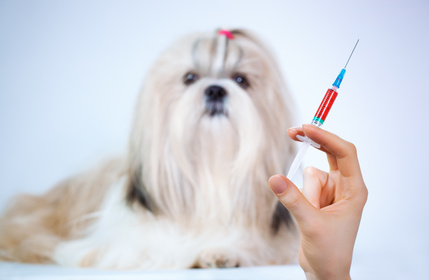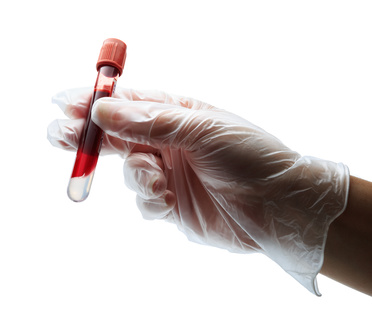FYI: If you buy something through a link on this site I may earn a commission - at NO extra cost to you.
Dog Vaccination 101
Dog vaccination is an integral part of Fido's healthcare, and being given appropriate vaccinations at the right time can protect him from some very serious diseases.
After the initial puppy shots that he got as a baby, regular boosters (at anywhere between one and three year intervals) are recommended by the American Animal Hospital Association and mainstream veterinarians.
There are three categories of canine vaccines:
- Core vaccines - recommended or required by state law
- Non-core vaccines - optional, dependent upon location/exposure/ lifestyle
- Additional vaccines - not usually recommended unless there is a specific reason
Core:
- Parvo (CPV)
- Distemper (CDV)
- Adenovirus-2 (CAV-2)
- Rabies
Non-Core:
- Parainfluenza (CPIV)
- Bordatella
- Lyme Disease
- Leptospriosis
Additional:
- Adenovirus-1 (CAV-1)
- Giardia
- Coronavirus
- Rattlesnake Venom
You can learn about the diseases many of the vaccines protect your dog from by visiting this page.... Dog Illnesses

Your dog's vaccination needs may not include vaccines from the second two categories.
In the first category, only one vaccine is required by LAW, and that is the Rabies vaccine.
Decades of dog-owning experience, extensive research and the personal experiences of dog owners across the country, leads me to believe that both the Parvo and the Distemper vaccines are extremely important, as is Adenovirus-2.
Core vaccines have proven to be safer, and more effective, than non-core vaccines.
Unless your dog is going to be exposed to diseases such as Kennel Cough or lives in an area where Leptospirosis is a potential problem (for example), these dog vaccination options are best left off Fido's schedule.
However, how often your dog should be vaccinated is a subject of debate among some veterinary professionals, scientists and researchers.
This is because there is growing concern that our dogs are being over-vaccinated and that this is causing long-term problems including an increase in auto-immune and inflammatory diseases, among others.
There is a LOT of information on this page as my aim is to give you everything you need to make the right vaccination decisions for your pet.
You can use these quick links to jump directly to the topic you're most interested in, or simply scroll down to read the entire article:
- Dog Vaccination Protocols (including recommendation and science)
- Adverse Reactions to Dog Vaccination
- What Antibody Titers Can Tell You
- Recap of Article (Cliff Notes!)
Dog Vaccination Protocols
Personally I'm not pro-vaccine or anti-vaccine in any definitive sense.

I believe that vaccination for certain diseases is sensible and saves lives, but I am concerned about the number and frequency of vaccinations recommended for our dogs.
From my own personal research I am concerned that the adjuvants (other 'stuff') that is in vaccines may not be safe for our pets in the volume, and frequency, that they are given.
I also feel the same way about the number of vaccines our children are given and the increasing number of vaccines pushed on adults, but that's another story!
However, I don't have any doubt that some vaccines (such as the one for Parvo) are essential and save the lives of puppies every day.
Current Veterinary Canine Vaccine Recommendations
It is recommended that puppies receive three sets of a combination vaccine (commonly a 3-in-1 shot which guards against Distemper, Parvo and Adenovirus).
These are given at three week intervals, starting anywhere between six and eight weeks of age.
A Rabies shot is also given at sixteen weeks. The Rabies vaccine is the only one that is mandated by LAW.
Each state has it's own code which applies to the Rabies vaccine and some states have exemptions for dogs who can prove a medical reason for NOT being vaccinated (age can be a factor for this in some states).
Check out this PDF for the laws that apply to your state.. State Rabies Laws
Presuming that your dog received all the above recommended vaccinations as a puppy, it had previously been widely accepted that he should get 'booster' shots as an adult.
Adult dogs who were not vaccinated, or only partly vaccinated, as puppies need a different vaccination schedule to get their initial immunity in place.
This booster protocol was based on the belief that immunity lasts only approximately 12 months from date of vaccination.
As of 2011 the AAHA guidelines recommend:
'With the exception of rabies vaccine, adult dogs should be revaccinated with a single dose of core vaccines (CDV/CPV/CAV-2) every 3 years or longer, regardless of the product used.'
Unfortunately many individual veterinary practices are still following the 'annual booster' protocol.
There are lots of reasons for this, including a distrust of change, confusion between AAHA and vaccine manufacturer guidelines, financial concerns (vaccinations provide a steady income stream for veterinary practices) and a real, but misguided, belief that vaccinating the 'old' way is better and safer for pets.
One additional concern that is starting to be recognized, is the danger of giving the same dose of vaccine (particularly focusing on the Rabies shot right now) to dogs of all sizes.
It makes perfect sense to question whether a 5lb puppy or dog can safely handle the same volume of vaccine as a 100lb+ dog.
In many cases it seems the answer is that they can't, and dogs are being vaccine injured, sometimes even dying, because of that.
Also, boarding kennels, dog training schools, doggie daycare and other places where dogs gather often require proof of annual vaccinations before allowing Fido on the premises.
Scientific Research Findings
In contrast to these recommendations, and the principles on which they're based,
*scientific studies and research shows that immunity to three of the most serious diseases (Parvo, Distemper and Adenovirus-2) is effective for a minimum of between 5 and 9 years after vaccination.
This means that the current recommendations for dog booster shots is overkill.
*Studies conducted by Dr. Ron Schultz, one of the foremost experts on immunology and vaccinations for pets
Dr Schultz is Professor and Chair of the Department of Pathobiological Sciences at the School of Veterinary Medicine at the University of Wisconsin-Madison.
In Dr Schultz' own words (and backed by 40 years of research)....
'One dose of the modified-live canine ‘core’ vaccine (against CDV, CAV-2 and CPV-2) , when administered at 16 weeks or older, will provide long lasting (many years to a lifetime) immunity in a very high percentage of animals.'
The AAHA guidelines appear to agree with this, as they state..
'The vaccination protocol that includes the minimum number of vaccines yet still provides a reasonable opportunity to immunize the dog would be: a single dose of a combined.... CDV, MLV CPV-2, with MLV CAV-2, administered at 16 wk of age or older, plus a Rabies vaccine at the same time....'
These statements indicate that young puppies are being over-vaccinated too.
Leaving pups un-vaccinated until 16 weeks might ensure that the single shot is effective as it would not be cancelled out by the natural immunity puppies get from their momma's milk.
In order for this to work, owners would need to be vigilant about keeping un-vaccinated puppies away from public areas and other dogs, as well as (ironically) veterinary clinics.
A pup who spends 16 weeks un-vaccinated but out-and-about and mixing with other pets could be at risk.
Dr John Robb, a veterinarian from Stamford was recently placed on probation by the Connecticut state veterinary board (after battling with them for four years) because he gave small dogs half-doses of the Rabies vaccine as he believed it dangerous, possibly deadly, to give such small animals such a large dose of vaccine.
However, many veterinarians and dog health professionals agree with Dr Robb's position.
Connecticut state legislators are also now considering a bill which would allow veterinarians to adjust the vaccine dosage and even entirely skip Rabies boosters, should they feel it that doing so would be in the best interests of their patients.
Check out this video to hear Dr Robb explain his position.. and more.
Regardless of the results of ongoing studies and a growing concern about over-vaccination, approximately 60% of veterinarians still push for annual 'dog booster shots', rather than the recommended 3 year protocols.
This puts dog owners in a difficult situation, and I believe, our dogs health at risk.
Dog Vaccination Reactions
The side effects of dog vaccinations can be extremely varied and range from mild to severe, occasionally even life-threatening.
It's impossible to know for sure whether or not your dog will have an adverse reaction to being vaccinated.
But there are some situations when the likelihood of a problem is greater. These include:
- When the vaccination is a combination shot (guards against several diseases at once).
- With 'killed' vaccines such as Rabies, Leptospirosis and Coronavirus
- If your dog is one of the breeds which are more at risk than others.
Breeds susceptible to adverse dog vaccination reactions include:
- Akita
- American Cocker Spaniel
- Dachshund
- German Shepherd
- Golden Retriever
- Great Dane
- Greyhound
- Irish Setter
- Kerry Blue Terrier
- Olde English Sheepdog
- Poodle
- Portuguese Water Dog
- Scottish Terrier
- Shetland Sheepdog
- Shih Tzu
- Vizsla
- Weimaraner
- West Highland White

In addition..... any puppy or dog who is mostly white or has a 'dilute' coat color (including blue or fawn), a merle coat, or black/white coat may have an increased risk of suffering side effects after being vaccinated.
Adverse reactions are divided into two categories... Mild or Moderate to Severe.
They can be short-term or long-term, sometimes developing into chronic health conditions.
A bad reaction to being vaccinated can happen at any age. Repeated over-vaccination may increase the risk of side effects.
Mild Dog Vaccination Reactions
The most common adverse reactions to canine vaccinations are usually short-lived, and include:
- A 'knot' or swelling at injection site
- Digestive upset (loss of appetite and/or loose stools)
- Lethargy
- Fever
Moderate/Severe Dog Vaccination Reactions
These types of adverse reaction to dog vaccination are less common than their milder counterparts.
Some happen with regularity (swelling/hives), others are rare (anaphylaxis), while others are only starting to be recognized as being related to vaccination (behavioral changes).
- Swelling or Hives
This usually happens within a few hours of your dog being vaccinated. Swelling is most noticeable around the muzzle and face. Hives can appear anywhere on the body. - Behavioral Changes
Some dogs become fearful, anxious or defensive and may show signs of obsessive compulsive behavior after being vaccinated. The Rabies shot is the most likely to produce this type of reaction, but it is not a common
- Anaphylaxis
This is a RARE side effect and indicates a severe allergic reaction which could be fatal. Usually happens within minutes of vaccation being given. May show as rapid and severe swelling, vomiting, diarrhea, loss of balance.
Long Term Dog Vaccination Reactions
Whether or not your dog has an immediate or short term adverse reaction to his shots, over time repeated vaccination can cause damage and result in chronic health issues.
This damage isn't just caused by the disease component of the vaccine, but also by the additional ingredients which are added for various reasons.
Research is showing that over-vaccination can cause a host of problems, many of them potentially serious.
Chronic health problems related to over vaccination in dogs include:
- A suppressed or weakened immune system
- Anxiety, nervousness, aggression or OCD behavior
- Chronic ear infections
- Skin disease
- Chronic allergies
- Inflammatory conditions such as arthritis and bowel disease
- Heart problems
- Asthma and respiratory problems
- Diabetes
- Kidney failure
- Liver Disease
- Cancer
Dog Vaccination and Antibody Titers
Current dog vaccination protocols are based on assumptions or estimates of two things:
- How well a dog's body has responded to vaccination by producing anti-bodies to specific diseases
- How long those antibodies will stay at a level high enough to be protective
Scientists and researchers are now beginning to prove that previously held assumptions are not accurate for most dogs, and that the number of vaccinations dogs receive during their lifetime is possibly doing more harm than good.
So, is there another way to approach this whole dog vaccination dilemma? Yes. Yes there is.
Measuring the level of antibodies (aka 'titers') in your dog's blood can give your veterinarian an accurate picture of how well protected (or not) Fido is against specific diseases.

If for example the titer level for Parvo antibodies is high enough, then your dog has immunity to Parvo and does not need revaccinating, yet.
If it is too low, then Fido may be at risk and can be given a booster shot.
It's as straightforward as that, for most dogs.
But, some breeds and some bloodlines have a genetic predisposition to NOT produce antibodies to Parvo, others have the same problem with Distemper.
These dogs are known as 'non responders' and it's estimated that there are 1 in 1000 non-responders to the Parvo vaccine and around 1 in 5000 non responders to the Distemper vaccine.
These dogs are going to be at risk regardless of their vaccination status, so taking extra care to keep them away from potential sources of infection (other dogs, pet stores, public areas such as dog parks or rest stops etc) is important.
Antibody titer tests are well suited for three of the four diseases treated by CORE vaccines:
- Parvo
- Distemper
- Adenovirus-2
Although it is possible to evaluate the antibody level for Rabies, the law of every State requires regular vaccination (most annually, some 3-yearly) regardless of titer/antibody levels.
However, this testing isn't appropriate for all canine diseases because in some illnesses the level of antibodies present does not necessarily equate with the same level of protection.
The only downside of using titer levels is that it may cost more to have the blood tests/lab work done than to give your dog the vaccines.
But, if your dog suffers from adverse reactions after being repeatedly vaccinated (especially if they are serious or chronic conditions) the eventual expense is likely to be much, much higher... in more ways than one.
See Dr Schultz's Canine Antibody Testing FAQ for more detailed info.
Dog Vaccination Recap For Owners
There is a LOT of information on this page, that's because I'd like for all dog owners to be as informed as possible about the benefits, and drawbacks, of vaccinating their pets.
But, by now your mind may be reeling with the stuff you've just read, you may even be a bit confused - so here's a recap to help you sort it all out :)
Current Canine Vaccine Protocols
There are four CORE vaccines recommended for dogs, these are to protect against Canine Parvovirus, Distemper, Adenovirus-2 and Rabies.
There are at least eight 'optional' vaccines which may be advisable for your dog depending on location and exposure to the diseases they are designed to prevent.
Latest American Animal Hospital Association guidelines recommend booster vaccinations for dogs be given every 3 years, rather than annually.
As these are only guidelines not requirements many veterinarians still insist on yearly boosters shots for their patients.
The only vaccine your dog is required to have by law is the Rabies vaccine.
Pro's & Con's of Dog Vaccination
Vaccination has been a way of controlling the spread of infectious diseases in humans and animals for a long time.
In recent years the increase in the number of times both people and pets are vaccinated during their lifetime has come under some scrutiny and science is beginning to recognize that in this case, more isn't necessarily better.
Benefits of Dog Vaccination
The benefit of dog vaccination is deceptively simple, and as a life-long dog owner I believe that protecting our pets from the most dangerous and infectious canine diseases is part of being a responsible dog parent.
- Vaccinations, when given at the right time, can protect your dog from serious (potentially fatal) diseases.
Drawbacks of Dog Vaccination
There are several negative aspects of dog vaccination.
The first two in the list below are unavoidable, but I personally believe these specific risks are outweighed by the benefit of the protection the vaccine can give.
However, the remaining risks are mostly associated with the sheer number of times we are encouraged/forced to vaccinate our dogs.
Over-vaccination is the biggest part of the problem.
- Vaccines themselves can cause symptoms of the disease they are designed to protect your dog from.
- The vaccine ingredients which have been added in addition to the immunological component can cause problems and adverse reactions in dogs.
- Adverse reactions in dogs who have been vaccinated can range from mild to severe or chronic, and can be short lived or last for the duration of the dogs life.
An Alternative to Scheduled Booster Vaccinations
Scheduled booster shots rely on the assumption that the protective effects of a vaccine will wear off in a year, or three. This is not the case.
It is possible to ask your veterinarian to check the antibody levels in your dogs' blood for several of the most dangerous diseases (including two of the three CORE vaccines).
If the antibody/titer levels show that he has sufficient immunity to a disease he does not (and should not) receive a booster shot for that disease.
Obviously if the levels are not high enough then he needs more protection and may require the shot if he's likely to be exposed to other dogs or environments where he could catch it.
Your vet should be able to give you a certificate which shows that your dog has the antibodies and is therefore immune, in place of shot records.
And finally... does your dog need to be vaccinated against doggy flu?
What about the recommendations that say our dogs need to be vaccinated against Canine Influenza? Is it yearly flu shots for dogs now?
Hardly. Canine flu does exist, two strains of it to be exact, but they're both pretty rare, and most healthy dogs recover just fine.
If your dog has any health issues or a compromised immune system he could be at risk of complications from dog flu.. but statistics show than less than 0.003% of dogs have contracted canine influenza since 2015 so weigh up his chances of catching it against any potential vaccine reactions before making a decision.
I hope this page has given you a better understanding of the benefits and risks of dog vaccination.
Best of luck with whichever route you choose, as long you know the pros and cons and your decision gives you peace of mind, it's the right one for you and your dog.
you might also like...
- Home
- Dog Health Information
- Dog Vaccination
FTC Disclosure: Some pages on this site contain affiliate links. I may earn on qualified purchases.





